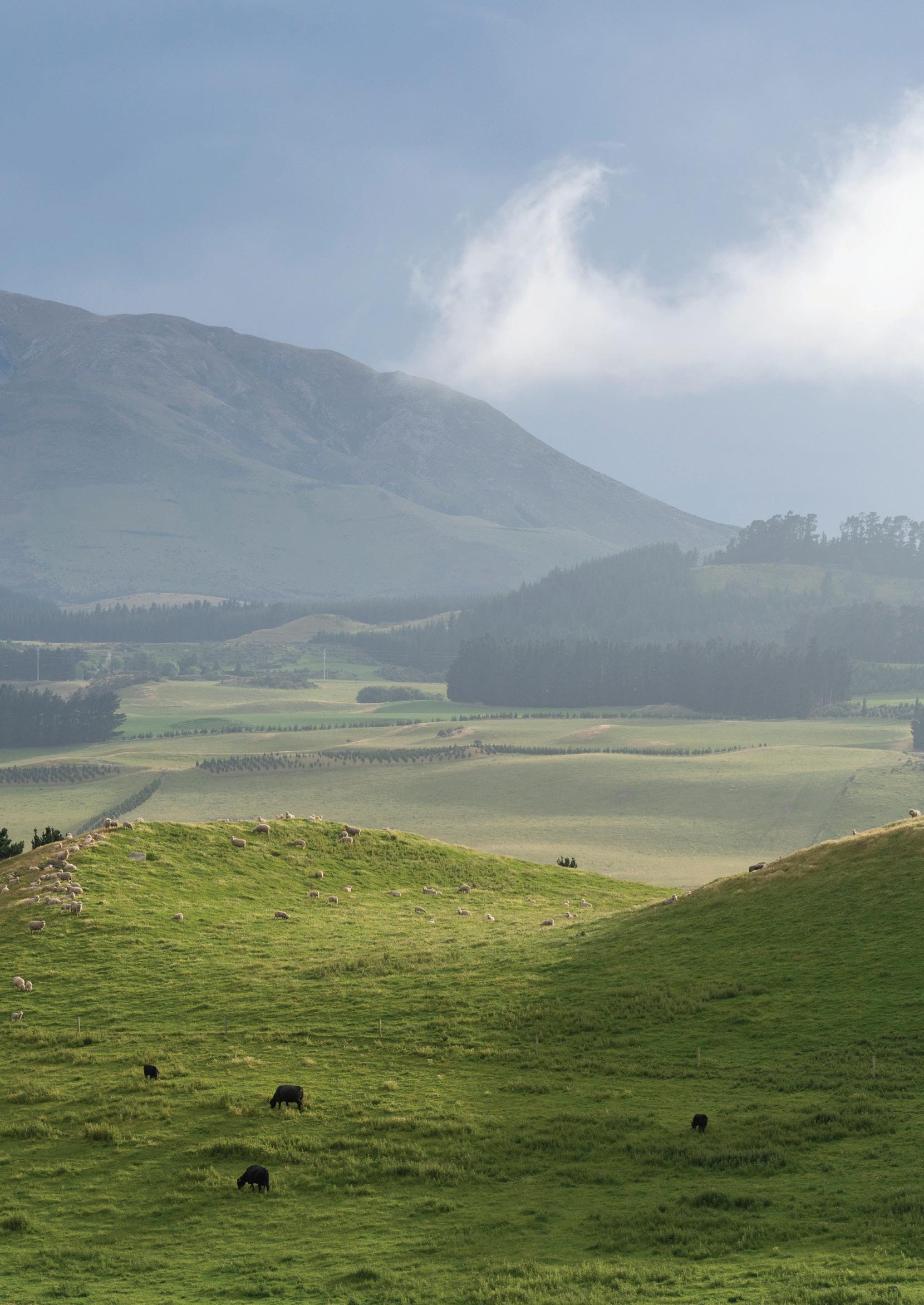Climate Change & Sustainability Report
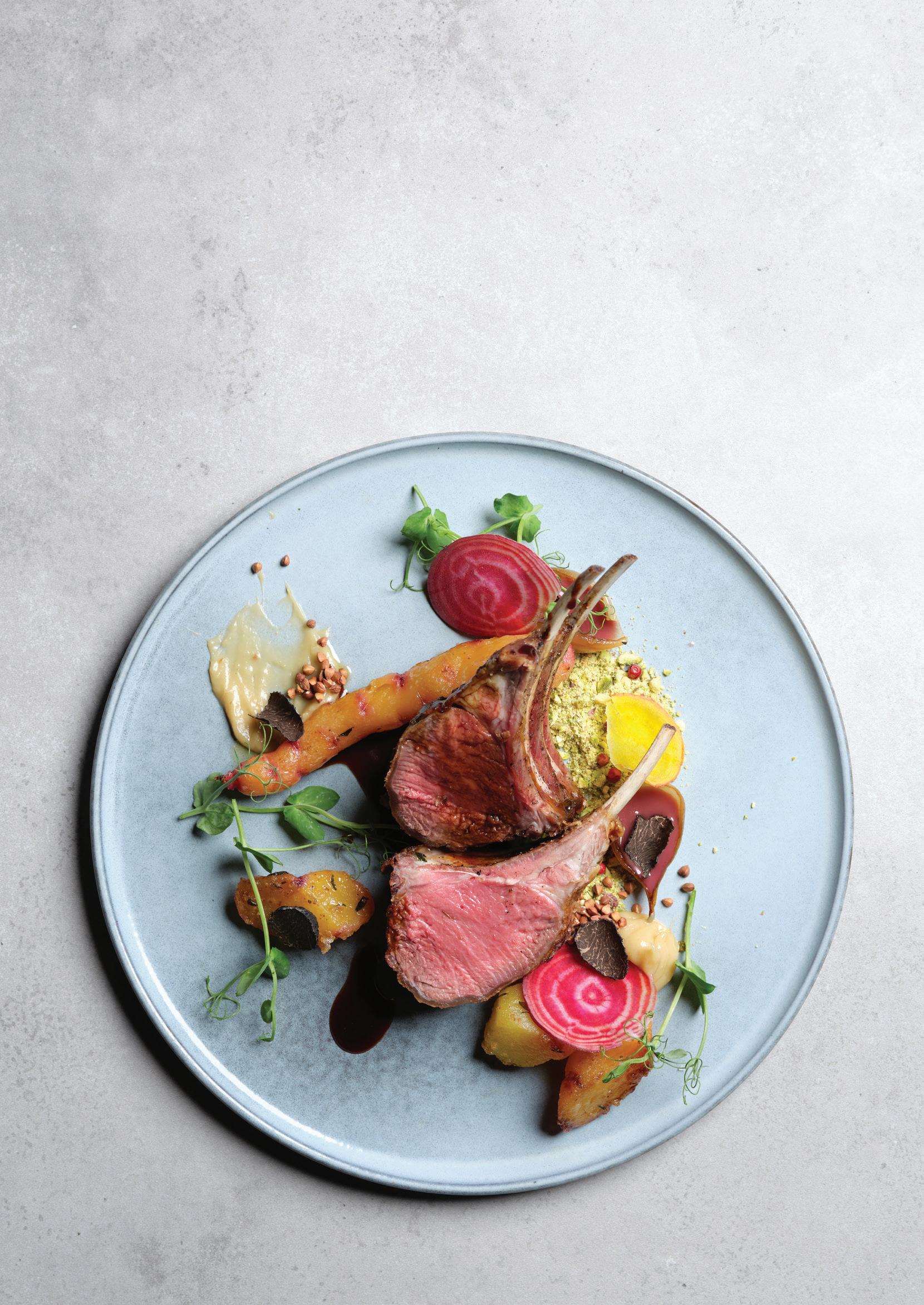


As a large business in New Zealand’s red meat sector, ANZCO Foods’ operations have a substantial impact on the country’s economic, environmental, and social activities. This report, covering ANZCO Foods’ New Zealand operations, has been compiled for the 2022 calendar year with reference to the Global Reporting Index 2021 Standards (see pages 37 to 39).
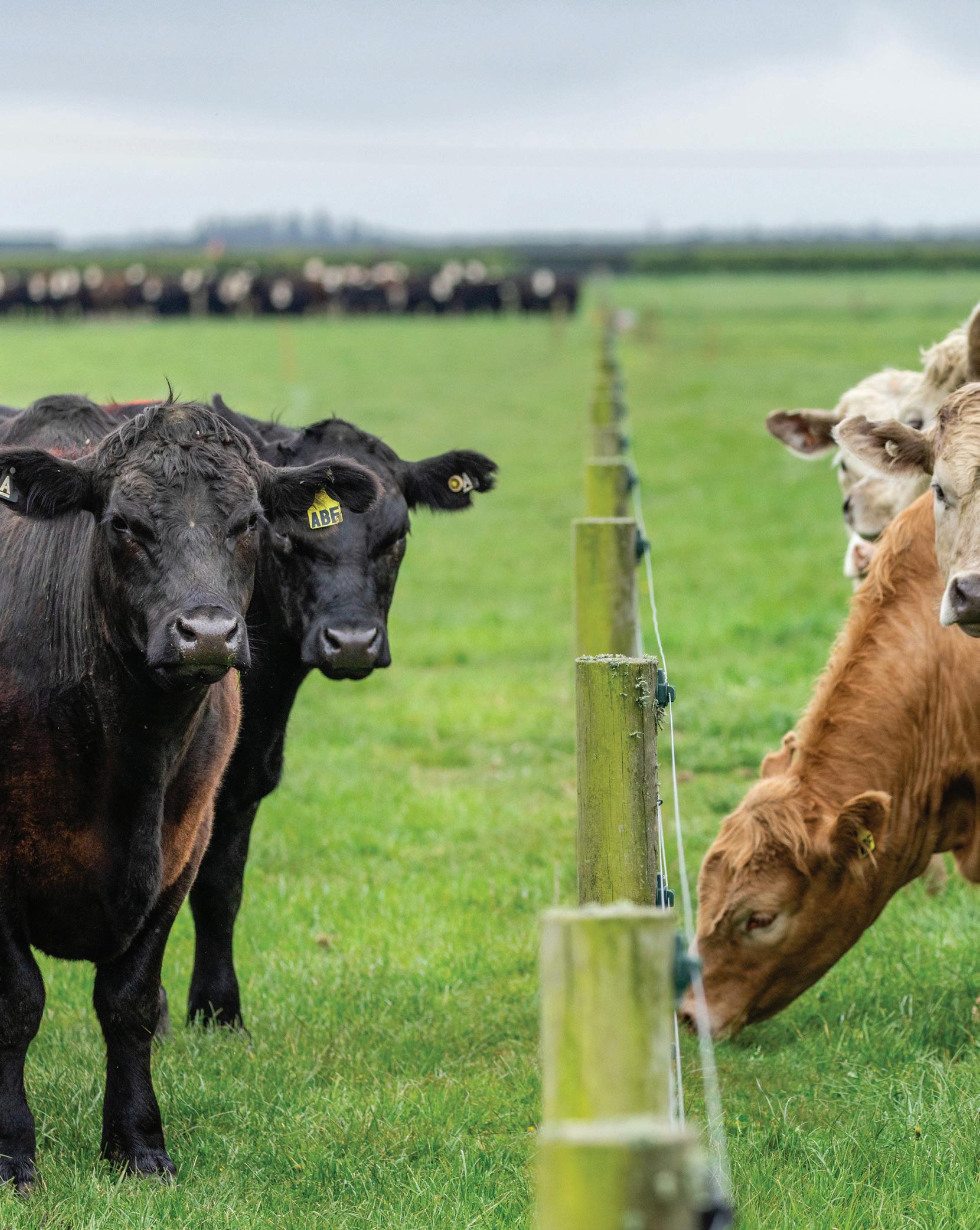
ANZCO Foods also recognises that many people and companies identify with the United Nations Sustainable
Development Goals (SDGs). We have listed the SDGs that are most relevant to ANZCO Foods (page 35).
ANZCO Foods’ Climate Change and Sustainability Report has been approved by the ANZCO Foods Board. This report has not been externally assured, however, we are committed to continually improving our sustainability reporting.
If you have any feedback or questions on our report, please email sustainability@anzcofoods.com

Businesses involved in primary industries are important to New Zealand’s economic wellbeing and we have a responsibility to look after the land and resources we use to support our sector.

I am proud of the progress ANZCO Foods continues to make in the climate change and sustainability space.
From an entry-level starting point, we have made significant gains and have achieved everything we set out to do in the first two years of our three-year strategy. We are committed to doing the best we can and we are focused on continuing to learn and do better.
One important area we are focused on doing better is looking after the health and safety of our people. In July 2022, three years after a contractor working for a cleaning company at ANZCO Foods Eltham died in a tragic accident, we were fined $340,000 and ordered to pay reparations of $103,000. We pleaded guilty to the charge and acknowledge the shortcomings in our contractor management process at the time of the accident.
We were devastated the accident occurred and were grateful the family allowed us to meet with them and apologise. We can’t turn back the clock when accidents such as this occur, but we can make sure we learn from them and share those lessons across our sites and with others in the wider industry.
After the accident we acted quickly to make the necessary changes at our Eltham site and reviewed equipment and contractor arrangements across the wider business. We refreshed our contractor management process and it is now audited regularly to ensure a culture of continuous improvement.
We also installed additional controls on key pieces of equipment.
We are focused on ensuring all workers on our sites go home safely to their friends and family every day. We are committed to improving our health and safety performance across ANZCO Foods and are involved in leading improvements at an industry level. We look forward to sharing more about this in next year’s report.
During the year, ANZCO Foods became a founding partner in an industry and government collaboration to accelerate the development, commercialisation, and delivery of effective and affordable solutions for farmers to significantly reduce agricultural emissions. The partnership between the Government, ANZCO Foods, Fonterra, Rabobank, Ravensdown, Silver Fern Farms, and Synlait, will see about $172m invested during the next four years to develop practical tools and technologies to help farmers address their on-farm emissions. The initiative is part of the new Centre for Climate Action on Agricultural Emissions and is a great example of industry working together to get new technologies into the hands of farmers sooner.
We also worked closely with the wider industry on the He Waka Eke Noa recommendations and the Government’s proposal to price agricultural emissions. Good progress was made towards the end of 2022 and collaboration continues as we work towards the primary industries being a strong and contributing sector, while all parties take responsibility for their emissions.
The company continues to invest in measuring and monitoring our use of resources, such as water and energy, to capture better quality data so we can
continue to reduce our use and footprint. In some instances, improving the quality of the data has shown increases in emissions directly related to capturing further freight movement data. The ultimate goal is to reduce our carbon footprint, so we will continue to improve the scope of the data we capture to ensure that our carbon footprint is an accurate depiction of our entire emission contribution.
We completed risk assessments across all our processing sites in 2022, with ongoing audits and actions to address the risks. The risks we’ve identified include our impact on the environment, our use of resources, and adapting our business operations to the changing environment both socially and environmentally.
COVID-19 continued to challenge our business during 2022. As a result of closed borders, the industry was significantly short of workers, and our employees were impacted as the waves of COVID-19 occurred around the country. Our team managed its way through these periods extremely well, taking steps to balance the wellbeing of our people with animal welfare requirements.
We worked closely with our communities during COVID-19 outbreaks and vaccination programmes, supplying meat, protective gear and tests to people working on the frontline. This work was in addition to our regular community support programmes that aim to support the communities in which we operate, especially those with a rural focus and those working in mental health areas.
ANZCO Foods is conscious that we will have access to fewer animals for processing as sheep and beef numbers across the sector continue to decline. As part of our sustainability strategy we are working to
ensure we do more with less. During the year, ANZCO Foods strengthened its capacity in the healthcare industry with the acquisition of the globally recognised biotechnology business Moregate Biotech. This acquisition complements ANZCO Foods’ existing biotech business Bovogen Biologicals based in Melbourne, Australia and reinforces the company’s value-add strategy. Moregate manufactures high-quality Australian- and New Zealand-sourced animal sera, animal proteins, enzymes, and specialty products used in the pharmaceutical, diagnostics, veterinary, vaccine, biotechnology, research, and nutritional industries. Moregate Biotech operates facilities in Brisbane, Australia and Hamilton, New Zealand. It exports products to customers in Europe, India, Asia, and the United States.
Financial stability is a vital part of being able to implement our climate change and sustainability projects and for the last three years we have achieved this goal, including winning the President’s Award for ANZCO Foods’ financial contribution to the wider Itoham Yonekyu Holdings group of which we are a part.
We are two years through our three-year climate change strategy and during 2023 will develop our 2024-2026 strategy that builds on what we’ve achieved and sets further ambitious goals for the business. We look forward to updating you on our progress.
Peter Conley Chief ExecutiveThis whakatauki signifies resilience, empowerment and hope. It refers to the ability to use skills and resources available to create success. It’s about being responsible for the resources and capabilities needed to grow and develop.
The environment in which we operate means the concept of tūrangawaewae – having a place to stand – is becoming increasingly important for ANZCO Foods.
Through the company’s ongoing and growing focus on climate change and sustainability, we work to ensure that our place in the world is sustainable, respected, and protected.
As we reflect on 2022, our sustainability strategy has continued to be the tumu whakarae (dependable leader) and has guided us through innovative decarbonisation milestones and environmental legislation changes.
As we have matured in this space in the last three years, we have seen ANZCO Foods deliver a range of projects focused on reducing the impact we have across the environment and building the resilience, skills, and resources required to support the vision we have for the future.
Our introduction of solar panels at our Marlborough processing site during the year was a major achievement, with the project representing best practice and progression along our sustainability journey with a reduction in carbon emissions and energy costs as we started generating our own energy. You can read more about all the projects we undertook in 2022 throughout this report.
ANZCO Foods’ decarbonisation roadmap leads the way in preparing the business to thrive in a low-carbon economy. The key milestone of introducing a high temperature heat pump at our Canterbury site to begin the removal of coal has been successful. This technology is also being introduced at our Kokiri site, which will be the last of our sites to implement the energy transition.
The decarbonisation roadmap is supported by our science-aligned target that aims to reduce our Scope 1 and Scope 2 emissions by 25% from the 2020 base year across our New Zealand sites by 2030.
We use our Toitū Carbon Reduce Certification to hold ourselves accountable for our emissions, and set the goals for reduction that we achieved in 2022 through the efforts of the climate change and sustainability function and its relationships with the wider business which continues to be engaged in this space.
Ensuring our local communities can thrive with no adverse effects from our business is important to ANZCO Foods and developing relationships with manawhenua is a priority for the company including working to support the natural environment through biodiversity plantings and habitat plans across all our New Zealand processing and manufacturing sites. Native planting will see Five Star Beef enhanced with 7,000 plants that have been eco-sourced from the site and grown at Te Kete Tipuranga o Huirapa Arowhenua nursery in Temuka in 2023.
2023 is the last year of our existing Climate Change and Sustainability strategy and during the year the Climate Change and Sustainability team will work with the business to continue to set ambitious goals to bring our refreshed strategy to life and to help us protect and respect the place and space we hold in the world.
Grace Macdonald Climate Change and Sustainability Manager
3,000 $1.5b
2 7
80 $1.67b
processing sites
annual contribution to New Zealand via salary, wages and supplier payments employees
manufacturing sites
turnover countries
5 offshore marketing offices
$770m assets export
2 biological proteins and sterile serums business
3 joint venture companies
1 cattle feedlot
ANZCO Foods is 100% owned by Japan’s Itoham Yonekyu Holdings, a top 10 global meat company based in Japan. To the year ended 31 March 2022, Itoham Yonekyu Holdings had revenue of $10.3b and an operating profit of $296m. Itoham has been a partner of ANZCO Foods since 1984 and a shareholder since 1995. It took full ownership in December 2017. Itoham Yonekyu Holdings’ ownership provides financial strength and strategic support to ANZCO’s current business and future aspirations. ANZCO Foods is Itoham Yonekyu Holdings’ largest international investment.
ANZCO Foods markets New Zealand beef and lamb products to the world as well as producing sophisticated manufactured food and healthcare products.

B2B and B2C beef and lamb brand focusing predominantly on ingredient supply to global food manufacturers
Premium part-cooked burger patties and meatballs designed to make every day delicious for NZ and Australian consumers
Our premium grass-fed beef brand, hand selected for New Zealand’s top restaurants
New Zealand’s finest lamb, servicing top chefs in Europe and other export markets
Pasture-raised, grainfinished beef renowned across Japan, China, and Europe for its tenderness and flavour
Stony River is exceptional grass-fed New Zealand Black Angus, committed to small-scale production to protect its purity and taste

ANZCO Foods has 11 locations across New Zealand
Moregate
ANZCO
ANZCO
ANZCO
ANZCO Foods
ANZCO Foods
Rangitikei (Marton)
Five Star Beef
ANZCO Foods
Manawatu (Bulls) Processing site
ANZCO Foods
Marlborough (Blenheim) Processing site
ANZCO Foods Corporate Office (Christchurch)
ANZCO Foods
Canterbury (Ashburton) Processing site Cattle, Lamb , Calves & Co-products
ANZCO Foods
Green Island (Dunedin) Manufacturing site Patties & Meatballs
ANZCO Foods has an intricate and complicated supply chain that procures livestock and other materials required by the business, and then distributes thousands of products to more than 80 countries.
Upstream procurement is managed by our team of internal experts. Suppliers of large quantities of goods are rigorously assessed during the tender process and all suppliers are governed by the Supplier Code of Conduct and Terms and Conditions – as a minimum. Livestock supply is the exception to this; it is managed by the dedicated livestock procurement team and governed by contracts where practical.
ANZCO Foods is an agricultural business, bringing the world nutrition and good health from New Zealand’s finest beef and lamb. Our main markets are China, Japan, USA, Europe, and the UK.
Through our integrated value chain, we control the procurement, processing, and manufacturing, as well as distribution and marketing of our beef and lamb. This enables us to implement extensive animal welfare and food safety standards as well as health and safety and corporate responsibility measures. This ultimately results in the responsible care of animals and our environment, and a product that we are proud to put our name on.
Our key stakeholders include individuals and groups that have interests that are, or could be, impacted by our activities. They include employees and contractors, farmers, customers, and suppliers, local communities where we are based, local and central government, and industry organisations. Our sustainability journey is strongly guided by their requirements. Engaging with each audience enables us to identify any concerns and learn what’s important to each group. This approach helps us prioritise
Stakeholder Why they’re important
ANZCO Foods’ 3,000 employees are at the heart of our business.
We have a range of channels and activities to engage with employees. Most of our employees work in processing and don’t have easy access to electronic communications, so we continue to identify ways we can engage and communicate with this important group.
Employees
ANZCO Foods uses a range of contractors at its corporate office, and processing and manufacturing sites.
our activities and resources and confirm material topics. ANZCO Foods has previously used an industry-developed materiality study to identify material topics. In addition, the company has informally assessed its materiality topics with feedback from key stakeholders (Board, employees, farmers, customers, industry, suppliers, community, government) and intends to formalise this process in the coming year to develop its materiality study.
Regular updates on
- TV screens in break rooms
- Facebook group
- Intranet
Face to face/meetings
Performance reviews
Internal conferences
Day-to-day team interactions
Annual inductions
Suggestion boxes
Competitions
Fundraising and volunteering
Scholarship programme
• Recruitment
Focus groups
Friends and family worker referral programme
• Team meetings and shift meetings
Regular meetings with the Meat Workers’ Union and union delegates
Contractor management systems and processes
Regular performance and service delivery reviews
- Individual communication
- Letters
- Phone calls
- Face to face
COVID-19
Health and safety, wellness and mental wellbeing
Keeping yourself safe
Speaking up and listening
Performance, development and training
People news
Company news, innovations, and performance
Community contribution
Tonga relief
Retention and recruitment
Health and safety
COVID-19
Code of Conduct
Environmental ANZCO news
Farmers
We work closely with our farmer suppliers to ensure we get access to their animals when we need them to meet our customer needs. We also support various programmes to ensure the animals and the environment are being cared for.
Farmer meetings
• Monthly email newsletters
Face-to-face with livestock representatives
Mailouts
Field days
Workshops
New producer portal and app
Advantage magazine and loyalty programme
communications
Social media
Farm assurance programmes
Loyalty
Advantage by ANZCO
Animal welfare
Compliance and legislation
On-farm performance
Company performance and news
Customers and suppliers
ANZCO Foods exports its products to more than 80 countries, supplying retailers and foodservice with New Zealand’s premium beef and lamb. Our customers are our connection with the end consumer. We engage with them so we can share the proud New Zealand story behind the products, and get their feedback on what’s important to their end consumers and markets.
We use a range of local, national, and international suppliers to maintain our sites, transport animals and our products, and ensure the overall smooth running of our business.
Face to face
Brand material
Electronic communications
• Industry events and exhibitions (not during COVID-19)
Collaboration on product innovation
Product provenance
Environment
Packaging
• NZ story
Product quality
Efficiency Issues
• Food shows and fairs
(starting up again following COVID-19 restrictions being relaxed in many countries)
Communities
ANZCO Foods’ processing sites are located throughout New Zealand, often in rural communities and where we are one of the biggest employers. We recognise this comes with responsibilities and aim to make a positive contribution in these locations. Improving our sites and managing resources well are ways we do this along with various local and national sponsorships, support, and seeking to be a good neighbour.
We recognise the importance of manawhenua to our operations and have taken a number of steps to build and enhance relationships with iwi where we are based. We recognise there is more work to do here and will have an increased focus during 2023.
Community meetings
Media
Sponsorships/donations
Salary/wages and supplier payments
Community relationships
Environmental impacts and enhancements
COVID-19 support
Company involvement and contribution
Recruitment
Wellbeing
Meetings
Electronic communications
Sponsorship/support
Biodiversity
Recruitment
Health programmes
COVID-19 support
Matariki
Sport
Areas of natural significance
As New Zealand’s fifth largest exporter, ANZCO Foods has an important role in the wider industry.
ANZCO Foods is active in a number of industry groups that seek to support the industry to develop and improve, especially as regulations and expectations around climate change and sustainability evolve.
Meat Industry Association
Industry, partnerships, and memberships
New Zealand Roundtable for Sustainable Beef
He Waka Eke Noa processor working group
Sustainable Business Council
Climate Leaders’ Coalition
Biosecurity Group
NZ Farm Assurance Incorporated
Centre for Climate Action on Agricultural Emissions
Meat Business Women
• Beef + Lamb NZ
AgResearch
BioTech NZ
AgriTech
Industry councils
Leading steering groups
Working/experts’ groups
Meetings
Phone calls and emails
Industry events
Conferences
Changing practices
Legislation
Areas for improvement –including environmental performance
Areas of collaboration
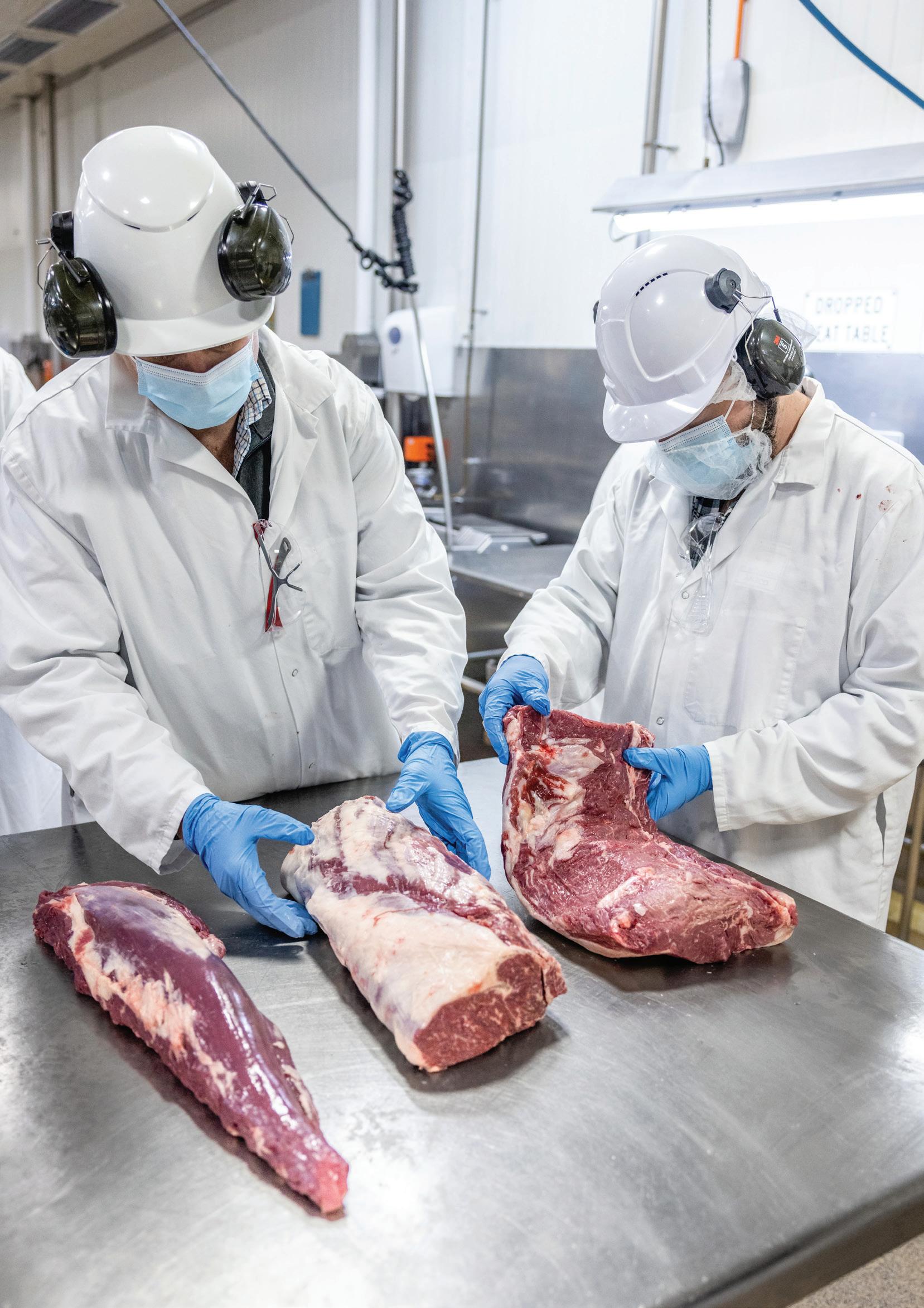
In 2020 ANZCO Foods developed its three-year Climate Change and Sustainability Strategy – outlined to the right. Pages 18 to 34 detail how we’ve performed in each of our strategic areas. In 2023 we will be reviewing and updating our Climate Change and Sustainability Strategy for the next three years.
Bringing you nutrition and good health from New Zealand’s finest beef and lamb
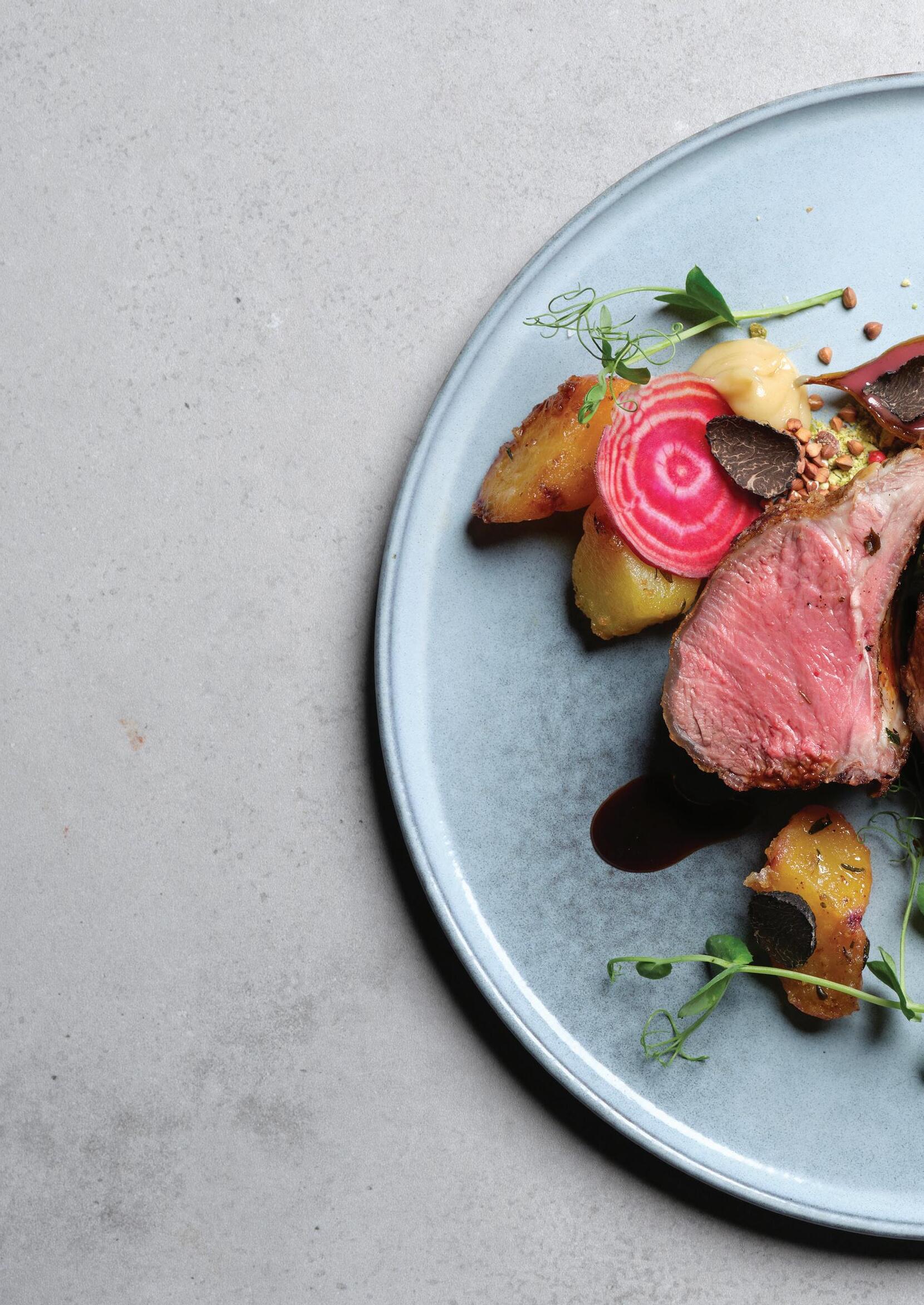
To be a thriving provider of the world’s most socially and environmentally responsible red meat products.

Reduce emissions
Protect water bodies
Improve soil health
Minimise waste and convert to value where possible
Increase habitat for native species
Assess, monitor, and address physical risks of climate change
Assess, monitor, and address transition risks of climate change Reduce freshwater use, energy consumption, and packaging Grow brand value through CC&S leadership
Protect and improve workers’ health, safety, and wellbeing
Embrace and enhance ANZCO’s workplace diversity
Strengthen wellbeing of our communities through our activities
Strengthen CC&S governance
Incorporate CC&S in core business strategies and financial plans
Ensure CC&S risk processes are established and mainstreamed
Establish CC&S metrics, targets, and monitoring processes
Verify CC&S risks, opportunities and performance ensuring these are transparently communicated
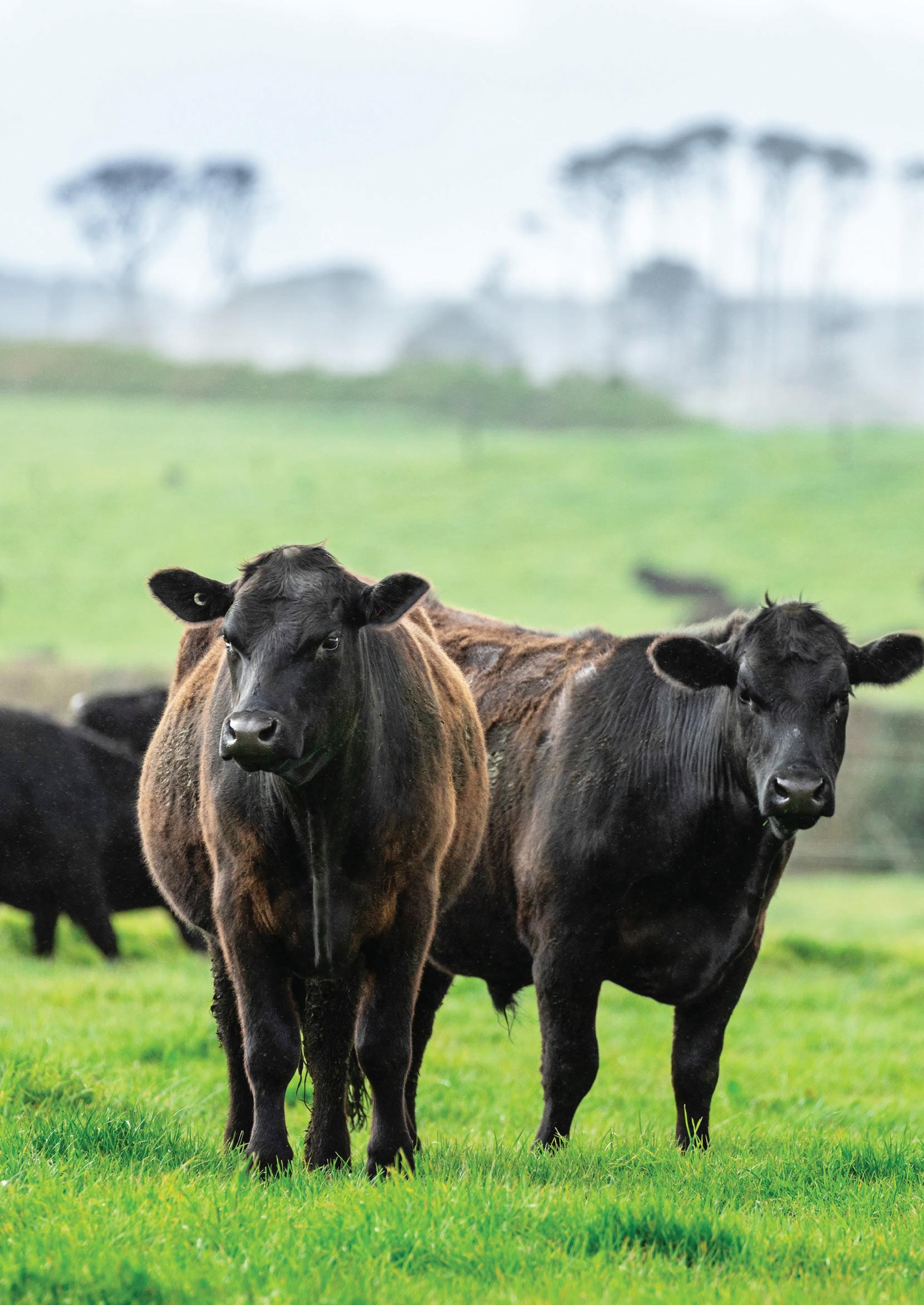
In 2022 we set ourselves the goals of replacing the coal boiler at our Kokiri site, carrying out research into methane inhibition, starting our move into solar energy, carrying out biodiversity at our Five Star Beef operation and working with a partner on a biodigester. We achieved all these goals, featured in the coming pages, along with other projects that help us reduce our environmental impact.
In 2021 we successfully completed our Toitū Carbon Reduce Certification across our New Zealand operations. We implemented emissions reduction projects across our biggest operations in Canterbury and continued to work with conservation groups to protect rare and threatened species at our sites.
Toitū is an independent certification that aligns with the internationally recognised ISO 14064-1, and greenhouse gas protocol from the IPCC’s fifth assessment report (2014).
The year 2022 was ANZCO Foods’ last surveillance year as part of its Toitū certification. Knowing this, ANZCO Foods has heavily invested in capturing all data sources as widely and accurately as possible before our first reduction year. Toitū expects emissions will continue to increase in the first three years as more data is captured. After that three-year period, a reduction is expected so certification can be maintained.
Knowing our carbon footprint enables ANZCO Foods to set science-based reduction goals. We have established projects to help us reduce our emissions. The data reported here represents the 2021 calendar year, as this is the most recent certified data available for ANZCO Foods. 0.80tCO2e produced per tonne of product processed.
Our Kokiri site received co-funding to replace an aging and increasingly inefficient 7MW coal-fired boiler with a new 1MW high-temperature heat pump that will use the waste heat from the existing refrigeration system to produce the majority of the hot water requirements for the site. Any shortfall will be supplied by a 2MW electric boiler. The project will remove all coal from the Kokiri site, which equates to 4,157tCO2 (12% of ANZCO’s energy footprint).
The new heat pump will be installed by the end of 2022 and operational by early 2023. ANZCO Foods Kokiri operates throughout the year and is a significant employer on the West Coast with 190 employees.
Providing environmentally sustainable beef and lamb products. Focusing on supporting and enhancing New Zealand’s reputation and environmental stewardship, and seeking to improve the impact we have on the environment.
Water
Canterbury Bore Yards, slaughter, processing, and cleaning
Kokiri Bore, River Yards, slaughter, processing, and cleaning
Rakaia Bore Yards, slaughter, processing, and cleaning
Manawatu Town supply Yards, slaughter, processing, and cleaning
Marlborough Bore
Yards, slaughter, processing, and cleaning
Eltham River and town supply Yards, slaughter, processing, and cleaning
Rangitikei Bore Yards, slaughter, processing, and cleaning
Waitara Town supply Manufacturing and cleaning
Green Island Town supply Manufacturing and cleaning
Five Star Beef Bore Livestock supply
As part of the 2022 work plan, data collection was top of mind as we look to set waste reduction targets in 2023. ANZCO Foods’ broad goal is to maximise as much product as possible to keep our material directed to disposal as low as possible. Where it is not possible to create value, preventing environmental harm is a priority. We worked with waste providers to understand where the 1,556tCO2e waste goes after it leaves our sites to help us identify areas for change. Waste-streams were identified and followed through a life-cycle process with strategies in place to ensure correct disposal every time. We are now working on waste reporting from these suppliers to ensure what we identified is monitored, managed and, where possible, mitigated.
The company is continually looking to reduce its impact on the environment. We have been investigating innovative technologies that can help manage waste streams. ANZCO Foods has formed a joint venture to carry out New Zealand’s first-ever pilot project to install and operate plant to process bovine effluent and waste from its Five Star Beef feedlot and its Canterbury processing plant. The pilot is an environmental remediation integrated system that transforms all the input waste organically into new high value-added resources. The pilot plant – situated on an ANZCO farm
Land
Water
Land
Water
Trade waste
Land and water
Land and water
Trade waste
Trade waste
Land
near Five Star Beef and ANZCO Foods Canterbury – will capture effluent and green-waste and convert it to highvalue products, including electricity, natural gas, fertiliser, and algae. This technology has been successfully implemented in Dubai and France, and if this proof of concept is successful in New Zealand, there is significant opportunity for it to be scaled up for use at other ANZCO Foods’ sites as well as other industry applications. The 12-month pilot aims to confirm that it can manage an average of 1MT of bio-waste a day from ANZCO Foods Canterbury and Five Star Beef, but potentially looking to manage up to 150,000MT of solid waste a year.
Scope 1 (excluding biogenic emissions)**
Scope 1 (biogenic emissions)**
Scope 2**
Scope 3**
Scope 1 GHG emissions: GHG emissions from sources that are owned or controlled by the company.
Scope 2 GHG emissions: GHG emissions from the generation of purchased electricity, heat and steam consumed by the company.
Scope 3 GHG emissions: GHG emissions that occur as a consequence of the activities of the company but occur from sources not owned or controlled by the company.
ANZCO’s Five Star Beef operation is trialling a natural feed supplement that reduces methane gas released by cows as part of the digestive process. Called Mootral Ruminant, it is a pellet made from a combination of garlic and citrus extract that doesn’t impact the taste or texture of the meat or milk but can reduce methane emissions by 38%. About 360 cows are part of the Five Star beef project at any one time. A measuring machine picks up the breath of the animals that have been fed Mootral, reads their tags and turns on sensors that measure the amount of methane gas in the animal’s breath. The measuring machines are calibrated weekly to ensure consistent results. ANZCO Foods then works with our project partners to generate data on methane emissions. We can also better understand methane outputs based on the feeds animals receive. The trial is part of a Ministry for Primary Industries Sustainable Food and Fibre Futures project that involves a small number of other on-farm trials. The trial started in early 2022 and runs for 12 months. At the end of the trial, Five Star Beef intends to continue using Mootral and will provide ongoing monitoring as part of normal operations. We’ll also be keeping a close eye on developments in the sector and will initiate further change if benefits become available.
In August 2022, ANZCO Foods Kokiri started a trial using cardboard dunnage to replace polystyrene packaging. Dunnage is the lining material used to pad containers and protect goods during shipping. It provides cushioning and stops movement of packages within a container when goods are in transit, making sure our products get to customers in perfect state. The trial dunnage is made from cardboard off-cuts and is supplied by our current packaging company. The cardboard solution provides an environmentally friendly option to polystyrene, which is made from petroleum and is slow to degrade. If the trial is successful, the idea will be rolled out to other sites.
ANZCO Foods Kokiri and Marlborough are replacing PVC aprons with thermal polyurethane aprons that provide a more environmentally friendly option for use. The thermal polyurethane aprons are more expensive to purchase than PVC, but they last longer and don’t stain as easily or as quickly. Our Marlborough site is already noticing the benefits with only 440 aprons used in the 2022 season compared to 1900 the previous season. The thermal polyurethane aprons are cleaned in the same way as PVC aprons, and they are lighter which makes them easier to move around in.
In 2018 ANZCO Foods Canterbury started work on a project to achieve a reduction in nitrogen in the plant wastewater. The project started to ensure compliance with resource consent requirements, alongside a desire to better understand the issues and assess options to improve effluent outputs from the site.
The resource consent specified the amount of water that could be drawn into the site and the amount we could discharge, with the wastewater used to irrigate two farms, one adjacent to the site and one 10km away (a total of 520ha). The site creates about 5,000 cubic metres of wastewater each day when processing at capacity.
The trial project focused on capturing real-time wastewater data and understanding the drivers that were causing the high-nitrate levels.
New effluent management systems with in-depth reporting of wastewater volumes were installed and best practices were put in place in processing areas to reduce unwanted waste.
As a result, the team has ensured compliance and reduced total nitrogen output by 27.6%.
A key part of the project’s success was making sure the local team was involved and engaged in all aspects of the project, with information shared regularly about what was going on. Information was also shared with neighbouring farms and the regional council, Environment Canterbury.
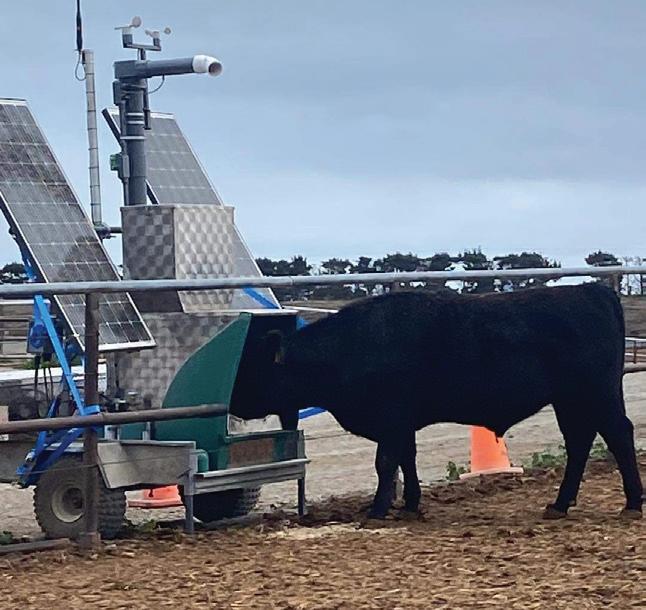
In 2020 ANZCO Foods Rakaia started a pilot project to recycle pelt-wash water, which saw a 13% reduction in on-site water use. The decision to trial the option came from a requirement to reduce wastewater use during winter when ground moisture levels are higher.
A reticulation pump was installed onsite to recycle the water through the pelt wash and to reduce the volume of water used during the process.
The groundwater the site uses is cold enough to provide sufficient cooling and rinsing of pelts with no impact on pelt quality.
ANZCO Foods’ sites are constantly reviewing water usage and putting in place actions to ensure minimum usage. Often individual site initiatives include simple things such as repairing leaks immediately, the installation of flow restrictors and sensors, and reviewing water volume use and frequency to reduce the use of water to become more sustainable, resourceful, and meet welfare and processing requirements.
Marlborough is known for its sunshine hours, so was the natural site to pilot ANZCO Foods’ use of solar energy. Solar panels were installed on the 302m2 roof at ANZCO Foods Marlborough in mid-October. Based on the province’s 2,500 sunshine hours a year the site has the potential to produce 75,000 KwH annually, giving us the ability to supplement our current electrical load with renewable energy. A move towards renewable energy at Marlborough not only lowers our carbon footprint, but also contributes to achieving our climate change and sustainability strategy and reduces energy costs for the site. We’ll assess the pilot and then look to expand the use of solar to other ANZCO sites.
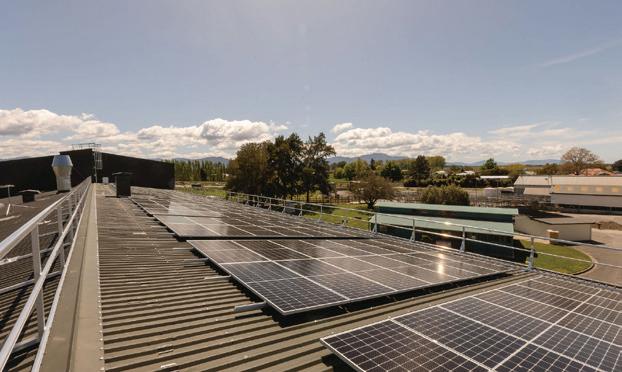
In March 2022, the ANZCO Rangitikei site started a sixmonth pilot project to better understand and provide detailed information on water use at the site. Nationally, ANZCO Foods already measures water use at a high level and with that information we have already been able to put in place significant improvements to reduce our water usage.
The pilot project at Rangitikei will enable the collection of more detailed and real-time information on water use across a number of strands and metrics. This includes the use and amount of water by individual departments at the site and the key times water is used. This additional information will help the team on site to drill down on water use, as well as provide important benchmarks for other ANZCO Foods sites. Using the data collected, sites will be able to put in place change to ensure minimal water wastage. The data collected will be displayed on a dashboard that is easily accessible to those that need it. This enhanced information will enable better and more sustainable decision making around water use. Pilot findings will be rolled out to other sites to enable them to capture that same level of information and to make changes that reflect our sustainability goals.
• Continue methane inhibition research
• Continue solar panel application
• Continue biodiversity development at Five Star Beef
• Continue biodigester project
• Site restoration programmes
• Increase numbers of hybrid vehicles in the fleet
During the year, progress was made on all our projects to reduce our risks and enhance our resilience, including integrating reporting standards for non-livestock suppliers focusing on carbon footprint reduction plans, working with farmer-suppliers to achieve their NZFAP+ standards and engaging with local iwi.
ANZCO Foods is part of a comprehensive assurance programme to maintain New Zealand’s reputation for producing the best meat and wool in the world.
New Zealand Farm Assurance Programmes (NZFAP and NZFAP+) have been developed to support farmers to meet world-class environmental stewardship expectations and provide certainty to millions of consumers worldwide that the meat and wool produced from New Zealand’s sheep, beef and deer farms is authentic, genuine, and safe. ANZCO has supported farmers through a series of workshops and helped farmers start the NZFAP process.
NZFAP has three fundamental components:
Origin, traceability and farm inputs
Security and food safety
Animal health and welfare
NZFAP+ builds on this, with additional modules on people, biosecurity and farm, and natural resources. It’s a continuous improvement programme to help farmers and growers reduce emissions and build resilience to climate change and it helps farmers to take responsibility for agricultural emissions and influence how we manage these aspects. Farms are audited at the start of the programme and then every three years to make sure standards and improvements are being maintained.
All lamb supplied to ANZCO Foods needs to be NZFAP accredited. In addition, ANZCO Foods has an antibiotic-free 100% grass-fed lamb programme to add further standards to satisfy specific markets for lamb. Lambs supplied under this programme are verified 100% grass-fed and raised without antibiotics in their lifetime. There are 782 ANZCO supplier farms on the programme; 303 in the North Island and 479 in the South.
Prepare to thrive in a lowcarbon economy subject to climate change and scarce natural capital inputs.
Focused on understanding the risk of climate change on our business and across our supply chain, and continuing to adapt and embrace the required change.
Reducing our risks and enhancing our resilience
Farmers are being asked to reduce their on-farm emissions, but aside from reducing stock numbers there are few tools and resources currently available to achieve the required reduction in methane emissions. New Zealand’s food and fibre sector is among the most emissions-efficient in the world, but we do need to address the methane problem. It’s important we have a viable primary sector that has access to the tools and resources that enable the sector to produce environmentally sustainable products.
To accelerate the development, commercialisation and delivery of effective and affordable solutions for farmers to significantly reduce agricultural emissions, ANZCO Foods became a founding partner in an industry and government collaboration. The partnership, between the Government, ANZCO Foods, Fonterra, Rabobank, Ravensdown, Silver Fern Farms and Synlait, will see around $172m invested during the next four years to develop practical tools and technologies to help farmers address their on-farm emissions. The initiative is part of the new Centre for Climate Action on Agricultural Emissions and is a great example of industry working together to get new technologies into the hands of farmers sooner.
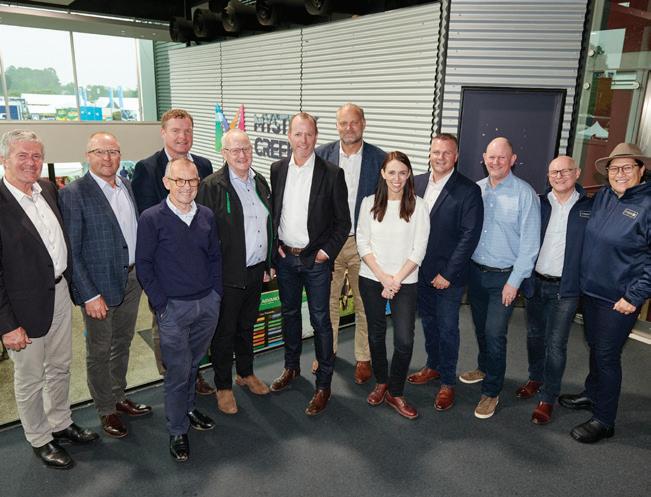
ANZCO’s involvement in the partnership is about working with like-minded organisations across the wider sector to accelerate research and development into technology and tools to benefit farmers. There aren’t going to be any quick fixes so working together means we can achieve more, faster. And with those involved having direct access to farmers, we can get the tools created into farmers’ hands faster to help reduce emissions while maintaining productive and profitable farming businesses. We’re excited to be involved with this sector group that is actively looking for solutions to help New Zealand maintain its position as a world leader.
ANZCO Foods has been working with the wider community on a bio-diversity project at its Five Star Beef operation. Seven thousand plants have been eco-sourced as seed from the site and grown at Te Kete Tipuranga o Huirapa Arowhenua nursery in Temuka. Site preparation is underway for planting by Te Kete Tipuranga o Huirapa in autumn 2023. Forest and Bird and Landcare Research are also involved in an advisory capacity.
Planned for 2023
• Continue integrating Climate Change and Sustainability reporting standards for nonlivestock suppliers focusing on carbon footprint reduction plans aligned with the Global Reporting Index standard
• Continue to work with livestock suppliers to progress into NZFAP+ standards
• Ongoing industry participation to reduce on-farm greenhouse gas emissions
• Conduct site impact assessments
• Relationship development with local and regional government
In 2022, our people and community goals were to engage with iwi, continue and strengthen our community support programme, develop and progress our diversity and inclusion programme, improve our H&S statistics, continue our H&S cultural programme and hold a conference for our H&S representatives.
ANZCO Foods has a goal to be the industry employer of choice and is building a strong culture around this, supported by a range of activities.
The current situation of low unemployment, COVID-19 and a global shortage of labour makes us even more conscious than usual of the importance of retaining our existing workforce.
ANZCO Foods believes in creating and maintaining an environment and culture that is attractive to high achievers, who will in turn perform to their best abilities to achieve our business objectives. Our goal is to be an employer of choice in the communities in which we operate, attracting, motivating and retaining employees, and remuneration is one aspect of our employee offering that will help us achieve our goal. The remuneration policy is guided by principles that our remuneration practice should:
Be aligned to ANZCO’s vision and values
Be transparent and understood by managers and employees
Be fair and equitable
Be the Living Wage as a minimum
Recognise individual and company performance
Reflect external market conditions and internal relativities
Be appropriate to the size and nature of our business. ANZCO Foods is focused on developing its people by providing opportunities for operational employees to up-skill in health and safety, quality, food safety and animal welfare, as well as providing individual targeted development opportunities across the business.
In 2022, ANZCO Foods continued its focus on diversity and inclusion. We know that when people feel listened to, are offered equal opportunities, have high levels of trust and feel valued, then it’s also good for business with higher engagement, improved performance and health and safety, and retention. Key activities during the year included:
Care for the health and wellbeing of our workers and community.
Focused on providing a positive workplace culture where our 3,000 employees are valued and where health, safety, and wellbeing are integrated into our operations; and we support the communities in which we are based.
A diversity and inclusion month that focused on unconscious bias and speaking up
Focus groups held at sites to understand the current situation and ideas for improvement
Expanding our steering group to include ambassadors from the sites
Providing CV and cover letter templates to help our people (many who have worked for us for years) apply for internal roles and promotions
An annual Living the Values survey with engagement and diversity questions
Te reo and cultural competency sessions focused on correct pronunciation of site names
Translating ANZCO Foods’ values into the primary languages of our team members
A range of cultural activities including celebrating New Zealand’s first formal Matariki holiday
A wellness campaign that included five ways to wellbeing, active listening, mental health, nutrition, physical matters, managing stress and burnout, and financial fitness
Outcomes from our Living the Values survey and site focus groups were closely aligned, and in 2023 we will continue to build a culture of respect and support our people to thrive.
ANZCO Foods has strong policies in place to comply with all employee legislation backed by strong documentation that is updated at least annually, as well as training and development. Compliance with legislation is a minimum standard for the business in this space.
ANZCO Foods takes it obligations to its employees seriously and all employees receive the Living Wage, as a minimum. 69% of ANZCO Foods’ 2,887 employees are covered by a collective bargaining agreement. For employees not covered by collective bargaining agreements, their working conditions and terms of employment are covered in individual employment agreements that are based on collective bargaining agreements.
During the year we successfully launched a friends and family referral programme where existing employees are rewarded when they recommend people they know for positions across the business.
In 2022, our first scholarship recipients took part in their study. The ANZCO Foods scholarship programme for waged employees offers four scholarships of $5,000 for up to three years for tertiary study or for learners to complete an apprenticeship. We continue to be impressed with the quality of the scholarship applications. Recipients for 2023 are undertaking teaching, midwifery and chiropractic study.
NZ European
Maori/ NZ Maori
Samoan
Cook Island/Cook
Island Maori
Fijian
Filipino
Tonga
Asian
Pakeha
South African
Indian
European
Romanian
Nepal
Chinese
British
Rarotongan
Tokelau
Malaysian
Latin American
Australian European
Kiribati
Korean
Sri Lanka
Ethiopean
French
Canadian
Egypt
Dutch
Papua New Guinea
Pacific Islander
Fijian Indian
Taiwan
Pakistan
Morrocan
African
South American
German
Irish
Tuvaluan
Indonesian Japanese
Bangladeshi
Bhutanese
Thailand
Afghanistan
Kenyan
Zimbabwean
Somalian
Brasil
10.3%
2,887 employees
This is higher than 2021’s employee turnover of 7.1%, in part because of borders opening again in 2022. This turnover is still low compared to the general market and our wider industry, and an increase is in keeping with what is happening in labour markets globally.
at January 2023
ANZCO’s ‘Back each other’ value is about working together to do what’s right, looking after each other, and keeping each other safe. Our guiding principle is that we want everyone to go home safely to their family and friends every day.
The Health and Safety at Work Act 2015 is an important piece of legislation, providing ANZCO Foods with the legislative framework. In addition to a focus on compliance, we also focus on developing our culture and engagement. We want a workplace where everyone is empowered to take action to deal with risks and where everyone can contribute towards having a positive culture.
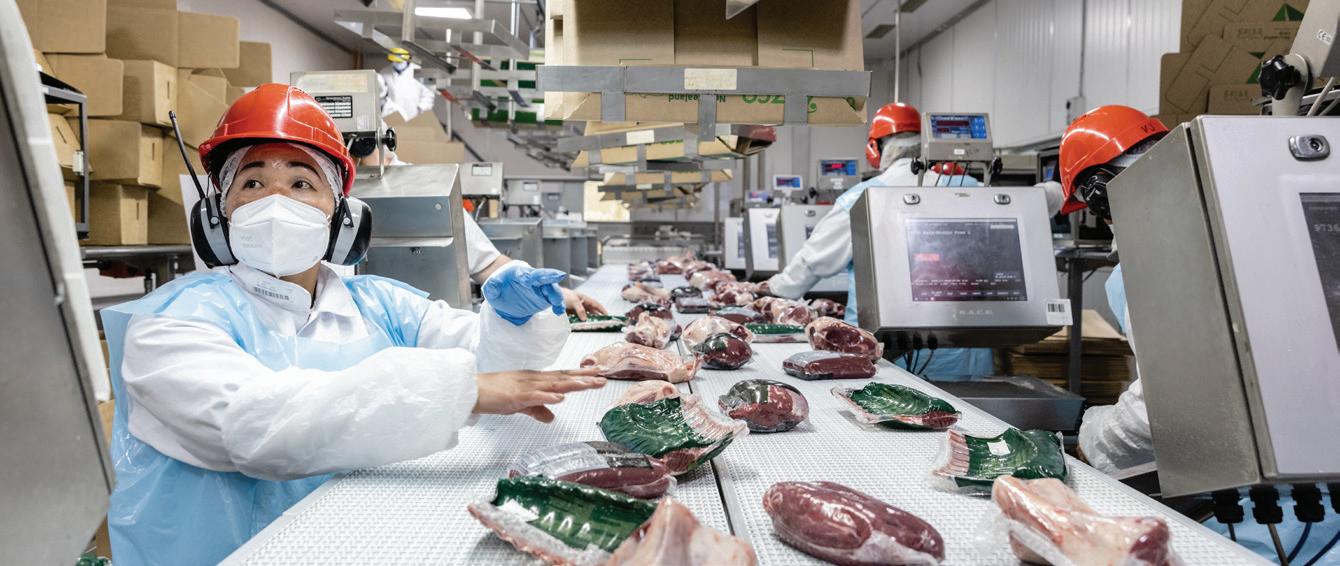
The Health and Safety Representatives (HSRs) at our sites play an important part in developing this desired culture. Their day-to-day roles in the business and connection with other workers provide a unique perspective. During the year, ANZCO held its inaugural Health and Safety Conference that looked at the critical HSR role, what’s working, and what we can improve. Feedback from the day was extremely positive and we’ll be making the conference an annual event. Other feedback from the day, and which we’re currently implementing, includes additional support for site health and safety, ideas on new ways we can communicate our health and safety messages and profiling ongoing training opportunities.
Our HSR team is supported by Health and Safety Action Groups at each site.
We’ve made a lot of progress in health and safety during the last decade and we’ll always be looking at how we can improve our performance in this business-critical area – it’s all about continuous improvement and we’ll never be finished.
We’ve made big investments in machinery safety, contractor management, traffic management, new technology, such as bandsaws, additional or interlocked guarding, and better PPE to make our sites safer places
to work. As well as making technical and engineering improvements, most recently we’ve been looking at positive health and safety initiatives and we’ve seen some great improvements in our health and safety statistics.
These initiatives focus on our key risk areas including knife safety; forklifts and trucks; slips, trips and falls; traffic management; and manual handling – and we have seen an ongoing reduction in these metrics.
Much of our work is repetitive and physically demanding. Employees are encouraged to prepare their bodies and minds for their work days with some gentle warm up exercises.
For employees recovering from injury, we understand the mental, physical and financial benefits of working while recovering. Our focus on injury management continues to show improvements in engagement with employees recovering from injuries.
In line with the wider industry, we track our health and safety with a number of measures including our Total Recordable Rate (TRR), Lost Time Injuries (LTI), Positive Safety Observations and we focus on individual initiatives to help manage our key risks.
TRR is an industry measure so we can benchmark. We also have an audit programme incorporating ACC and other high-risk activities.
Our contractor management practices were further strengthened during the year with an active programme to have all contractors signed up to Sitewise – a prequalification system that grades a contractor’s health and safety capability, and we are working with suppliers to improve their rating within the qualification system.
Internally, our SafetyNet system is used to capture all incidents, accidents and near misses for transparency and to assess to trends. All accidents are investigated. ANZCO Foods identifies actions for improvements which are tracked and monitored, and all learnings are shared.
Our Total Recordable Rate for 2022 was consistent with 2021 however the severity of injuries contributing to this is trending downwards.
19%
COVID-19 and staff absences contributed to a lower number of positive safety observations however we continue to see a positive reporting culture.
Our Lost Time Injuries are down with a positive trend in the decrease of the severity of serious injuries.
As a company in the primary sector, most of our community contribution is focused on the rural areas in which we operate and on mental wellbeing, because we recognise the impact this has on our stakeholders.
ANZCO Foods has developed two main programmes to support communities where we are based, and also supports a range of other activities and organisations.
Through our Sponsor a School programme, ANZCO Foods annually donates more than $100,000 to rural schools nominated by dairy farmers suppliers. Since 2011, ANZCO Foods has donated more than $1.3m to rural schools. This is a company donation – there is no cost incurred by participating farmers. In 2022 we donated more than $140,000 to schools in the North and South islands who used the donations for a range of things, from sports equipment to in-class resources. The Sponsor a School programme is ANZCO’s way of thanking dairy farmers for choosing ANZCO Foods and showing our support for rural schools and communities.
Each year our Helping Make Ends Meat programme donates more than $100,000 worth of meat to foodbanks around the country through the New Zealand Food Network. We know foodbanks often struggle to access protein and we get positive feedback from them about this contribution.
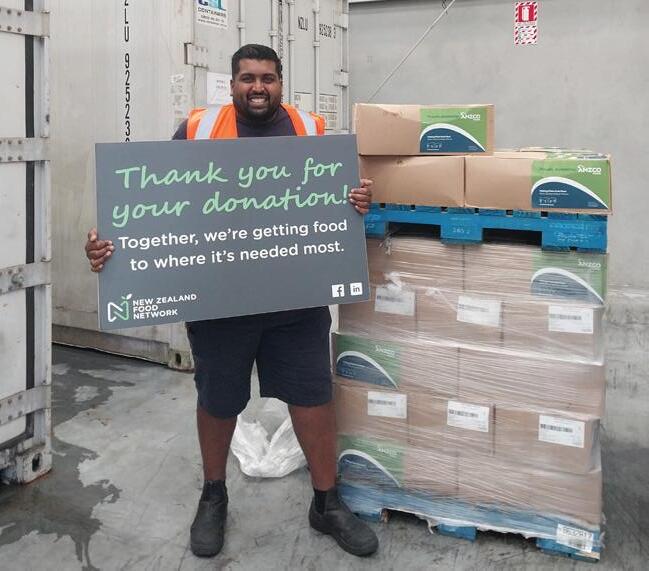
We also invest in a range of programmes to support farmer wellbeing, including Surfing for Farmers, Gumboot Friday, Farmstrong and Rural Support Trust. In addition, we have purchased and are supporting the annual operating costs of a St John ambulance that is currently servicing the rural Canterbury community.
During the year we formalised our relationship with the Canterbury West Coast Air Rescue Trust, which provides a lifeline for people in rural communities and those who work and play in rugged rural environments, where the speed of a rescue helicopter can make all the difference in saving lives. The Trust carries out more than 1,000 rescues a year
and is supported by fundraising and volunteers.
In 2022, ANZCO’s Earthquake Trust Fund identified a project for the remaining funds raised after the Christchurch earthquakes. Most of the funds raised were donated to the barbecue area at Christchurch’s Margaret Mahy playground in 2016. After considering many options, ANZCO Foods decided to use remaining funds in the trust to support the Youth Mental Health outpatient facility being established by the Maia Foundation at Hillmorton in Christchurch. Youth in Canterbury have been through a lot since the earthquakes and there’s a growing need for mental health support with one in four youths experiencing issues. Canterbury’s existing youth mental health outpatients’ facility at the old Princess Margaret Hospital in Cashmere is prison-like and doesn’t meet the needs of youth or staff.
In 2022, Basketball New Zealand launched a new women’s basketball league called Tauihi Basketball Aotearoa to elevate the status of women’s basketball in New Zealand. With four central North Island sites, ANZCO Foods was proud to support the Tokomanawa Queens – covering central New Zealand – which took out the inaugural competition.
Planned for 2023
• Develop iwi engagement/ collaboration
• Continue to develop the community support programme including Helping Make Ends Meat, Sponsor a School, Maia Health Foundation, and Canterbury West Coast Air Rescue Trust
• Implement 2023 diversity and inclusion plans including running the engagement and diversity survey again and further rolling out te reo modules and cultural competency
• Improve our H&S statistics, continue our H&S cultural programme, and hold the annual forum for H&S representatives
ANZCO Foods achieved most of the goals it set in the systems and structures area of its strategy, except for the maturity assessment which is now scheduled for early in 2023.
Our Corporate Governance structure ensures an appropriate level of support and oversight of our key climate risks.
The full board considers a wide range of risks including economic, environment, social and governance risks. The reports developed by our teams ensure the board is informed of the key risks and issues (for example climate change and health and safety) that contribute to their decision making.
ANZCO’s top 10 strategic risks (which include climate change and sustainability) are reported to the board’s Audit and Risk Committee quarterly. Risks rated “high” and above are regularly monitored for active management by the leadership team. People throughout the organisation are encouraged to identify and manage potential risks.
The integrated nature of our operations means that climate-related risks are regularly assessed as part of our strategic, operating and emerging risk assessments. Mitigation plans for material risks are implemented to proactively manage the impact onANZCO Foods.
Planned for 2023
• Update the maturity assessment
• Update the company group risk agenda
• Undertake a materiality assessment
• Consolidate Scope 3 emissions reporting
Our Code of Conduct is designed to help employees make informed choices about their behaviour and decisionmaking at work. The Code supports our corporate policy framework. Our policies address key risks and set expected standards of behaviour for our people. Policies are in place to ensure we comply with all employee legislation and support this with robust documentation that is updated annually, as well as providing training and development. Policies are available on the company intranet. Each ANZCO Foods’ processing and manufacturing site has its own collective agreement and handbook featuring a range of polices and expectations. Key policies are to ensure we provide a fair and equitable workplace including:
Equal opportunities
• Health and Safety
Bullying and Harassment
Establish the right structures and systems to manage accelerating environmental and social change.
Focused on the role and value of structures, policies and processes that provide organisations with resilience in uncertain times and benchmarks to test ourselves against.
We have a Protected Disclosure (whistleblowing) policy that offers protections for employees who disclose serious wrongdoing. A form, which goes directly to the General Manager People and Capability, is available for anyone to raise a concern, anonymously if they choose.
During the year we issued a Child Labour policy that also
outlines ways in which employees can raise a concern if they think there is a breach of this policy.
Our policies are reviewed at least annually. Information on embedding our commitment to our policies and processes remediation are featured in our employment agreements and the internal and external codes of conduct. In addition, people can raise a concern through the Union.
• Setting and approving strategic direction
• Approving major investments
• Monitoring performance
• Reviewing compliance systems
• Overseeing commitment to sustainable development, community, environment and the health and safety of our people
Ensuring appropriate systems to manage risk
ANZCO Foods acknowledges that the United Nations Sustainable Development Goals were developed for implementation at a country level, however we also recognise that people connect with these so, where relevant, we have reported on how our climate change and sustainability activities are in keeping with the wider spirit of what the Sustainable Development Goals aim to achieve.


Created by nature. Crafted with care. Shared with pride.
